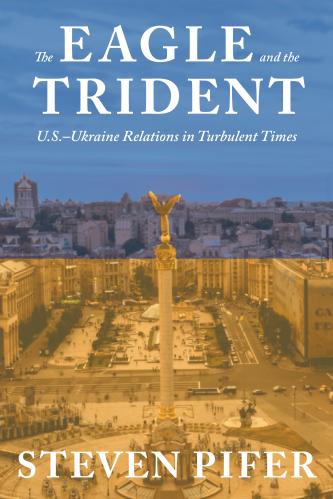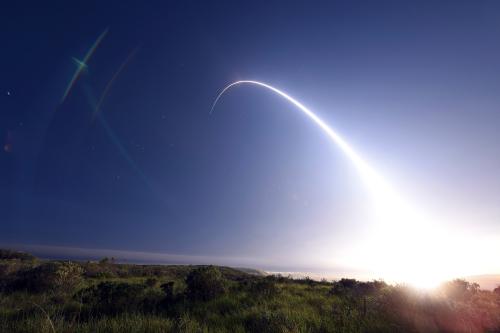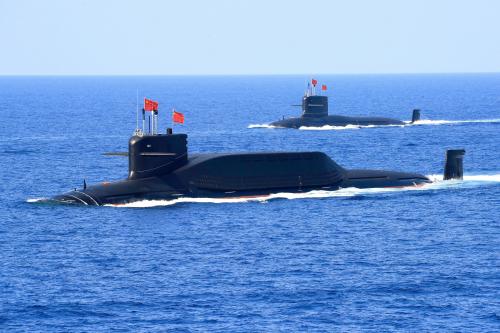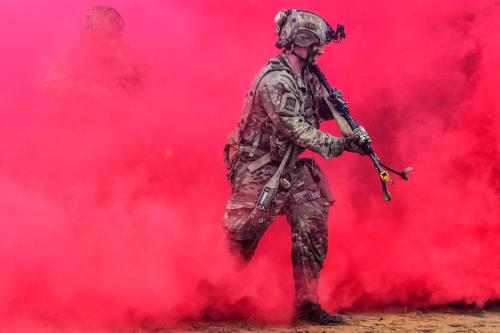Over the past year, President Donald Trump and administration officials have made clear the importance they attach to engaging China in nuclear arms control along with Russia. The Chinese have made equally clear their disinterest in participating.
Moscow, meanwhile, has stepped back from its position that the next round of nuclear arms reductions should be multilateral rather than a continuation of the bilateral process that produced the New Strategic Arms Reduction Treaty (New START) in 2010. Russian leaders are not opposed to bringing in China — to the contrary, they’d undoubtedly welcome it. But Moscow seems prepared to leave the heavy lifting to the United States.
China wants no part
Press reports last year indicated that Trump had expressed interest in doing more on arms control than extending New START. The president in April reportedly ordered development of an approach to involve China and Russia in a new negotiation to cover not just deployed strategic nuclear arms (covered by New START) but other nuclear weapons as well.
Getting China into a nuclear arms control negotiation, while desirable, is unrealistic. The U.S. and Russian nuclear arsenals are each more than an order of magnitude larger than China’s. The Federation of American Scientists puts the U.S. and Russian arsenals at 3,800 and 4,490 nuclear weapons respectively, as opposed to China’s 290. Beijing has long taken the position that it will not participate in negotiations until that gap narrows.
The administration might increase its prospects for success by instead asking that, in the context of further U.S.-Russian nuclear reductions, China provide transparency on the total size of its arsenal and pledge unilaterally not to build up as long as the United States and Russia continued to reduce. Just getting China to do that would require a herculean effort.
Russia will not help
Russian officials now pooh-pooh the idea of bringing China into the nuclear arms control process. Last December, Foreign Minister Sergey Lavrov told Russian television:
Russia had consulted with the Chinese [on the need to join nuclear arms talks] … They said their strategic nuclear forces were incomparable to those of Russia and the United States, and they saw no reason to participate in such talks. We told the Americans that the Chinese had determined their position and we respect it.
One month earlier, Lavrov told a Moscow conference on nuclear nonproliferation: “It is an open provocation to insist on China’s participation in the process, as a precondition, despite Beijing’s clearly stated and many times repeated position on this.”
Just last week, the Russian foreign minister said:
The Americans are constantly trying to impose an option involving China’s accession [to arms negotiations]. But China has repeatedly stated in public that it will not join these talks … If China suddenly changes its mind, we will be pleased to participate in multilateral talks. But we will not try to convince China.
Sergey Lavrov of 2019-20, meet Sergey Lavrov of 2013. In June 2013, he stated:
We have also to bear in mind that further steps that could be proposed on reducing strategic offensive weapons will have to be considered in a multilateral format, because the further reductions would bring us to levels comparable to the nuclear arsenals possessed by countries other than Russia and the U.S.
It is not clear how the Russian foreign minister calculated that further U.S. and Russian reductions would bring their arsenals to the levels of third countries (France, China, and Britain are each at or below 300 total nuclear arms, as are other nuclear-armed states).
Lavrov’s intention, however, regarding the inclusion of third countries in a multilateral negotiation was clear. He repeated a position that Moscow adopted in 2011 following President Obama’s proposal that New START be followed by another bilateral U.S.-Russian arms reduction negotiation that would include non-strategic nuclear arms as well as strategic weapons.
In May 2016, the Russian foreign ministry spokeswoman said:
We believe that implementation of the [New] START Treaty will exhaust our capabilities regarding mutual cuts with the United States. It is necessary to look for ways to involve in the nuclear disarmament process all other states possessing military nuclear potential, first of all Washington’s allies in NATO.
The Kremlin undoubtedly would like to see China engaged in nuclear arms negotiations. While Russian officials do not state it openly, their large stockpile of non-strategic nuclear weapons is motivated in major part by concern about growing Chinese conventional capabilities — a point that Russian nuclear experts admit in private conversations. And one can see why: Russia’s military presently musters a total of 900,000 personnel, while China’s ground forces alone number 975,000. Non-strategic nuclear weapons pose a big equalizer.
Why the change in Russia’s position?
So, what happened? Russia and China have aligned more closely over the past decade (though limits to that relationship remain). Moscow seems eager to accommodate its large, dynamically growing partner and avoids raising questions unwelcome in Beijing. Hence, Moscow has backed away from years of earlier calls for a multilateralization of nuclear arms control — at least as far as China is concerned — and did so just as Trump began making China’s inclusion a priority.
For now, Moscow is perfectly happy to leave the heavy lifting to Washington.
The Russians do not want to antagonize Beijing, but if Trump and the Americans somehow can coax China into the process, that suits Russian interests, and they will not say no. For now, Moscow is perfectly happy to leave the heavy lifting to Washington. (There is precedent for this; in the trilateral process that led Ukraine to agree to give up the nuclear weapons on its soil following the Soviet Union’s collapse, Russian negotiators let their American counterparts take the lead in pressing Kyiv to come to terms.)
The Russian attitude will only complicate the Trump administration’s at best long-shot hope of involving China in a future nuclear arms control process. Whereas Moscow might have been a partner in this endeavor under earlier circumstances, the Russians now will let Washington fly solo.
The Brookings Institution is committed to quality, independence, and impact.
We are supported by a diverse array of funders. In line with our values and policies, each Brookings publication represents the sole views of its author(s).








Commentary
Russia’s shifting views of multilateral nuclear arms control with China
February 19, 2020